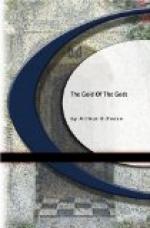“I can’t tell you the story,” she resumed. “I don’t know it. My father knew it. But it was some kind of family secret, for he never told me. Once when I asked him he put me off; told me to wait until I was a little older.”
“And you think that may have something to do with the case?” asked Kennedy, trying to draw out anything more that she knew.
“I don’t know,” she answered frankly. “But don’t you think that it is strange—an ancestor of mine murdered and now, hundreds of years afterward, my father, the last of his line in direct descent, murdered in the same way, by an Inca dagger that has disappeared?”
“Then you were listening while I was talking to Professor Norton?” shot out Kennedy, not unkindly, but rather as a surprise test to see what she would say.
“You cannot blame me for that,” she returned simply.
“Hardly,” smiled Kennedy. “And I appreciate your reticence—as well as your coming here finally to tell me. Indeed, it is strange. Surely you must have some other suspicions,” he persisted, “something that you feel, even though you do not know?”
Kennedy was leaning forward, looking deeply into her eyes, as if he would read what was passing in her mind. She met his gaze for a moment, then looked away.
“You heard Mr. Lockwood say that he had become associated with a Mr. Whitney, Mr. Stuart Whitney, down in Wall Street?” she ventured.
Kennedy did not take his eyes from her face as he sought to extract the reluctant words from her.
“Mr. Whitney has been largely interested in Peru, in business and in mining,” she went on slowly. “He has given large sums to scholars down there, to Professor Norton’s expeditions from New York. I—I’m afraid of that Mr. Whitney!”
Her quiet tone had risen to a pitch of tremulous excitement. Her face, which had been pale from the strain of the tragedy, was now full of colour, and her breast rose and fell with suppressed emotion.
“Afraid of him—why?” asked Kennedy.
There was no more reticence. Once having said so much, she seemed to feel that she must go on and tell her fears.
“Because,” she went on, “he—he knows a woman—whom my father knew.” A sudden flash of fire seemed to light up her dark eyes. “A woman of Truxillo,” she continued, “Senora de Moche.”
“De Moche,” repeated Kennedy, recalling the name and a still unexplained incident of our first interview. “Who is this Senora de Moche?” he asked, studying her as if she had been under a lens.
“A Peruvian of an old Indian family,” she replied, in a low tone, as if the words were forced from her. “She has come to New York with her son, Alfonso. You remember—you met him. He is studying here at the University.”
Again I noted the different manner in which she spoke the two names of mother and son. Evidently there was some feud, some barrier between her and the elder woman, which did not extend to Alfonso.




